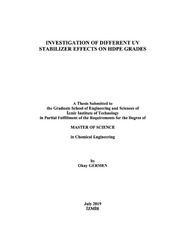Please use this identifier to cite or link to this item:
https://hdl.handle.net/11147/7472| Title: | Investigation of Different Uv Stabilizer Effects on Hdpe Grades | Other Titles: | Yype Türlerinde Farklı Uv Stabilizer Katkıların Etkilerinin İncelenmesi | Authors: | Germen, Oktay | Advisors: | Şeker, Erol | Keywords: | HALS High density polyethylene Polymers UV stabilization Plastic materials |
Publisher: | Izmir Institute of Technology | Source: | Germen, O. (2019).Investigation of different UV stabilizer effects on HDPE grades.Unpublished master's thesis, İzmir Institute of Technology, İzmir, Turkey | Abstract: | In this study, a performance Hindered Amin Light Stabilizer (HALS), used to prevent the structure of polymeric materials from UV and thermal degradation, was investigated using High Density Polyethylene (HDPE) injection grade. The primary goal of this study is to understand the effects of different HALS types, that consist of low molecular mass and high molecular mass, on mechanical and physical properties of HDPE using a design of experiment method. In addition, Minitab program was used to analyze the data, obtained with the experimental design, with ANOVA analyses to estimate the OIT and Loss Elongation% responses of the samples made with varying HALS amounts and types. Briefly, Elongation Lost% which is the ratio of Elongation% Before Aging to Elongation % After Aging and OIT(Oxidative Induction Time) were studied in different recipes of HDPE Injection Molding Plaque specimens in order to measure the effect of HALS1 (Tin770), HALS2(Tin622) and HALS3(Chim944) on aging. One-year of aging was simulated using a standard aging chamber. It was observed that synergetic effect of HALS1 with HALS3 was much more effective than thatof HALS2 with HALS3. Moreover, it was determined that the samples containing antioxidant which did not contain any HALS additive were completely degraded at the end of the same aging process. This study showed that OIT results of samples were affected directly by the amount of HALS3 which protected the polymer against long-term exposure to UV radiation and high temperature whereas neither HALS1 nor HALS2 showed the same protection. Bu çalışmada, polimerik malzemeleri, UV bozunma ve termal bozunmadan koruyan Hindered Amin Işık Stabilzanlarının (HALS), YYPE (Yüksek Yoğunluk Polietilen) enjeksiyonluk türündeki performansı incelenmiştir. Çalışmanın ana amacı, düşük ve yüksek molekül ağırlığına sahip HALS türlerinin, YYPE'nin fiziksel ve mekanik özelliklerine etkisidir. Ayrıca, Minitab programı yardımıyla, istatistiksel yöntemlerden faydananılarak, farklı HALS reçeteleriyle (bağımsız değişkenler), OIT(Oksijenle Indüklenme Süresi) ve Uzama Kaybı%'ni tahmin etmek için regresyon denklemleri üretilmiştir. HALS1 (Tin770), HALS2(Tin622) and HALS3(Chim944)'ün, değişik reçetelerde hazırlanmış YYPE Enjeksiyonla kalıplanmış plaka numunelerine etkisi Yaşlandırma Sonrası Uzama%'nın Yaşlandırma Öncesi Uzama %'ya oranı olan Uzama Kaybı% ve OIT analizleriyle çalışılmıştır. Bir yıllık yaşlandırma simule edilmiştir. HALS1'in HALS3 ile sinerjetik etkisinin, HALS2'nin HALS3 ile sinerjetik etkisinden çok daha güçlü olduğu görülmüştür. Ayrıca, herhangi bir HALS katkı maddesi içermeyen ancak antioksidan içeren numunelerin yaşlandırmanın sonunda tamamen bozulduğu tespit edilmiştir. Bu çalışma, HALS1 ve HALS2 katkılarından ziyade, polimeri uzun vadeli şiddetli koşullara (UV radyasyonu, yüksek sıcaklık) koruyan HALS3 miktarının, numunelerin OIT sonuçları üzerinde direk etkili olduğunu göstermiştir. |
Description: | Thesis (Master)--Izmir Institute of Technology, Chemical Engineering, Izmir, 2019 Includes bibliographical references (leaves: 43-44) Text in English; Abstract: Turkish and English |
URI: | https://hdl.handle.net/11147/7472 |
| Appears in Collections: | Master Degree / Yüksek Lisans Tezleri |
Files in This Item:
| File | Description | Size | Format | |
|---|---|---|---|---|
| T002015.pdf | MasterThesis | 22 MB | Adobe PDF |  View/Open |
CORE Recommender
Page view(s)
270
checked on Apr 28, 2025
Download(s)
192
checked on Apr 28, 2025
Google ScholarTM
Check
Items in GCRIS Repository are protected by copyright, with all rights reserved, unless otherwise indicated.